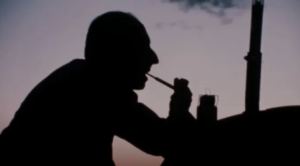
‘Becoming Cousteau,’ National Geographic Documentary Films
National Geographic’s Becoming Cousteau (2021), directed and produced by Liz Garbus, is an interesting and timely feature-length biography of Jacques-Yves Cousteau. (The Odyssey, a 2016 film, was a biopic on his life, based on a nonfiction book.) Becoming is not a deep dive, so to speak, but it does certain things very well.
The first is that it reintroduces to a new generation the man who was once world-famous and, “next to the President, [the person] most Americans would like to meet,” as the documentary says. Many young people now do not even recognize his name—Cousteau was born in 1910, after all—but to those born who grew up before the ‘80s he was an icon: adventurer (a term he disliked), scientist, inventor, and conservationist. Cousteau’s presentation of the beautiful and mysterious undersea world was one reason I went into military diving, and the source of a joke, as we dove in freezing, polluted water, that “Jacques Cousteau fucked me up.”
(Younger people might be surprised to learn of the depth of the homage to him in Wes Anderson’s The Life Aquatic with Steve Zissou [2004], with its famous ship, diver-cap-wearing crew, mannered filmmaking as revenue stream, strained father-son relationship, and fraught marriage to a remarkable woman. In the recursive way of pop culture, Becoming’s occasional use of animation seems to nod to Anderson’s film.)
The second thing Becoming does well is to show the change in Cousteau’s attitudes toward his work over time. I had not remembered that most of the seed money for his explorations on the famous Calypso came from the petroleum industry. (“What people don’t know is that Calypso was responsible for the great wealth of Abu Dhabi,” a commentator says.) Early footage of Cousteau and his men riding land tortoises like horses, dynamiting a reef in order to count the (dead) fish, or bludgeoning sharks with an axe reveal a disrespect toward that which they studied and popularized.
“We didn’t know any better,” Cousteau says regretfully, and he refused to screen his first film in later years.
That is part of the point of his legacy: few seemed to know better or to care, back then. But as he and his team began to realize, as early as the ‘60s, that the natural world was dying from pollution and changing on a planetary scale, his films became less about the entertainment of novelty and more an alarm bell for global disaster. They were “no longer about beautiful little fishes,” he says, but “films…dealing with the fate of mankind.”
The third thing this documentary does well is to show Cousteau’s emotions at different points in his life, and how those drove his actions: as ambitious eccentric in the French navy; excited captain able to make a life of voyaging on his own terms by hustling; budding filmmaker gratified to achieve major success in his art (his intern in the early ‘60s was Louis Malle, of all people, with whom Cousteau worked to win a Palme d’Or and Oscar for his first movie); frustrated environmental Cassandra; father devastated to lose his grown son in a business-related accident; cynical near-misanthrope who believed there is no hope for human life on earth; and (perhaps) someone who believed by the end that his contributions amounted to something, including multi-national legislation to help save the Antarctic.
Cousteau saw the sea as the great mystery, which created in us an ancient “need to know.” What we have learned by that need—with Cousteau as a model of our drive—has changed. One of his/our realizations, achieved perhaps too late, is that the observer changes what is observed. Despite Cousteau’s mission to educate the public about the undersea world, as a step toward valuing and preserving it, for example, the museum that he directed helped “killer algae” spread around the world, something the documentary does not mention.
Another realization is that our cleverness, which makes us human and sometimes wonderful, is killing us. Cousteau believed early on we would evolve into “Homo Aquaticus,” returning to the sea as whales did, and he imagined building underwater cities bulldozed on the ocean floor. By the end he renounced that idea as another form of colonization and once told an audience of children, “I think that we should first build a good civilization on land.”
This man whose very name evokes water (eau) and coastlines (coust) spent his life at sea, and his story serves to show the complexity of all our stories, and how we do not know what to do with them. The documentary points out that ABC, which had a smash hit with Cousteau, “dropped him because he was getting too dark.” (According to one of his co-authors, he said: “It’s too late. We spoil the planet more and more.”) He grew furious at autograph seekers appreciating his celebrity more than his message.
The documentary portrays a mystery itself, the world’s resistance to easy messaging. In literature the sea is often portrayed as the great mother of us all, but in this film there is an Eve-like quality about what we learn there.
“I had that feeling of trespassing when I submerged,” Cousteau said. “The feeling that you’re cheating. We’re land animals, and we’re not supposed to cross the threshold.” (Cousteau was the co-inventor of scuba technology.) “Nature warns us: Don’t go. But we do go, and the sense of trespass vanishes.” It is hard to say what this ultimately means.
